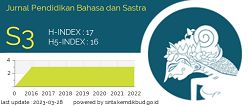MOTIVATIONAL FACTORS IN THE INDONESIAN EFL WRITING CLASSROOM
Abstract
Abstrak
Meskipun motivasi dianggap penting sebagai salah satu faktor utama penentu pencapaian belajar siswa, pokok persoalan berkaitan dengan faktor-faktor yang mempengaruhi motivasi siswa dalam mempelajari mata kuliah tertentu, khususnya menulis Bahasa Inggris sebagai Bahasa Asing yang berkaitan dengan para mahasiswa Indonesia, belum dikaji secara mendalam. Kajian dalam makalah ini bertujuan untuk meneliti faktor motivasi yang dirasakan oleh para mahasiswa Indonesia di kelas menulis Bahasa Inggris sebagai Bahasa Asing mereka. Peserta dalam kajian ini adalah 19 mahasiswa semester pertama di kelas Creative Writing F di Program Studi Pendidikan Guru Bahasa Inggris, Universitas Kristen Satya Wacana, tahun ajaran 2014/2015. Data penelitian diambil dari jurnal reflektif dimana para peserta menuliskan refleksi mereka berkaitan dengan pokok persoalan tersebut. Analisa data nampak membuktikan bahwa kinerja positif seorang guru, teman sekelas yang inspiratif, orang tua yang memotivasi, dan suasana kelas yang positif merupakan faktor utama yang mempengaruhi motivasi belajar para mahasiswa di dalam kelas mereka. Pada akhirnya, kajian ini nampak mengindikasikan pentingnya kolaborasi konstruktif antara guru, mahasiswa, dan orang tua sebagai faktor utama penentu motivasi belajar dan pencapaian akademis para siswa di dalam kelas menulis mereka.
Kata-kata kunci: motivasi, faktor motivasi, menulis Bahasa Inggris sebagai Bahasa Asing, kelas Creative Writing
Abstract
Despite the essence of motivation as one of primary determinants for students’ learning achievement, issues of factors influencing students’ motivation in learning a particular subject, particularly English as a Foreign Language (EFL) writing with regard to Indonesian university students, have not been discussed sufficiently. The study reported in this paper aims to explore motivational factors perceived by Indonesian university students in their EFL writing classroom. The participants of the study were 19 freshmen at Creative Writing Class F within the English Language Education Study Program, Faculty of Language and Literature, Satya Wacana Christian University (ED-SWCU), academic year 2014/2015. Data was collected through reflective journals in which the participants wrote their reflections dealing with the issues. The data analysis appeared to prove that positive teacher’s performance, inspiring classmates, motivational parents, and positive classroom atmosphere were primary factors influencing the students’ learning motivation in their classroom. Finally, the present study would seem to indicate the importance of constructive collaboration among teachers, students, and parents in determining the students’ learning motivation and academic achievement in their EFL writing classroom.
Keywords: motivation, motivational factors, EFL writing, Creative Writing class
Full Text:
PDFReferences
Alwasilah, A.C. (2013, March 02). Designing education for modernity. The Jakarta Post. Retrieved November 17, 2014, from http://www.thejakartapost.com/news/2013/03/02/designing-education-modernity.html
Astuti, S.P. (2013). Teachers’ and students’ perceptions of motivational teaching strategies in an Indonesian high school context. TEFLIN Journal, 24(1), 14-31.
Brown, H. D. (2007). Principles of language learning and teaching (5th ed.). New York: Pearson Education, Inc.
Cohen, L., Manion, L., & Morrison, K. (2007). Research methods in education. New York: Routledge.
Creswell, J.W. (2003). Research design: qualitative, quantitative, and mixed method approaches (2nd ed.). Thousand Oaks, California: Sage Publications, Inc.
Dornyei, Z & Ushioda, E. (2001). Teaching and researching motivation (2th ed.). Harlow: Pearson Education Limited.
Dornyei, Z. (1994). Motivation and motivating in the foreign language classroom. The Modern Language Journal, 78 (3), 273-284.
Ellis, R. (1994). The study of second language acquisition. Oxford: Oxford University Press.
Ellis, R. (1997). Second language acquisition. Oxford: Oxford University
Faculty of Language and Literature Satya Wacana Christian University. (2014). Student handbook. Salatiga: Faculty of Language and Literature Satya Wacana Christian University.
Gass, S.M & Selinker, L. (2001). Second language acquisition: An introductory course (2nd ed). New Jersey: Lawrence Erlbaum Associates.
Harmer, J. (2007). The practice of English language teaching. Essex: Pearson Education Limited.
Hatch, J.M. (2002). Doing qualitative research in education settings. New York: State University of New York Press.
Kimura, Y., Nakata, Y., & Okumura, T. (2000). Language learning motivation of EFL learners in Japan-A cross sectional analysis of various learning milieus. JALT Journal, .47-65.
Lopez, M.G.M. (2011). The motivational properties of emotions in Foreign Language Learning. Colomb.Appl.Linguist.J, (13)2, 43-59.
McDonough, S. (1983). Psychology in foreign language teaching. George Allen & Unwin: London.
Neuman, W.L. (2006). Social research methods qualitative and quantitative approaches (6th ed.). Boston: Pearson.
Rahman, S. (2005). Orientations and motivation in English language learning: a study of Bangladeshi students at undergraduate level. Asian EFL Journal, 7(1), 1-26.
Reid, G. (2007). Motivating learners in the classroom: ideas and strategies. London: Paul Champman Publishing.
Schunk, D.H., Pintrich, P.R., & Meece, J.L. (2008). Motivation in education: Theory, research, and applications. New Jersey: Pearson Education, Inc.
Shoaib, A & Dornyei, Z. (2005). Affect in life-long learning: Exploring L2 motivation as a dynamic process. In Benson, P. and Nunan, D.(Eds.), Learners’ stories: Difference and diversity in language learning. Cambridge: Cambridge University Press.
Smith, M. K. (2012). What is pedagogy? the encyclopedia of informal education. Retrieved November 17, 2014, from http://infed.org/mobi/what-is-pedagogy
Sutantoputri, N.W & Watt, H.M.G. (2012). Attribution and motivation: A cultural study among Indonesian university students. International Journal of Higher Education, 1(2), 118-129.
Sutantoputri, N.W & Watt, H.M.G. (2013). Attribution and motivation: Gender, ethnicity, and religion differences among Indonesian university students. International Journal of Higher Education, 2(1), 12-21.
Tran, L.T. (2007). Learners’ motivation and identity in the Vietnamese EFL writing classroom. English Teaching: Practice and Critique, 6(1), 151-163.
Troike, M.S. (2006). Introducing second language acquisition. Cambridge: Cambridge University Press.
DOI: https://doi.org/10.17509/bs_jpbsp.v15i1.794
Refbacks
- There are currently no refbacks.
Copyright (c)
p-ISSN 1412-0712 | e-ISSN 2527-8312
JPBS is published by:
Fakultas Pendidikan Bahasa dan Sastra (Faculty of Language and Literature Education), Universitas Pendidikan Indonesia,
in cooperation with
TEFLIN, and APPBIPA


